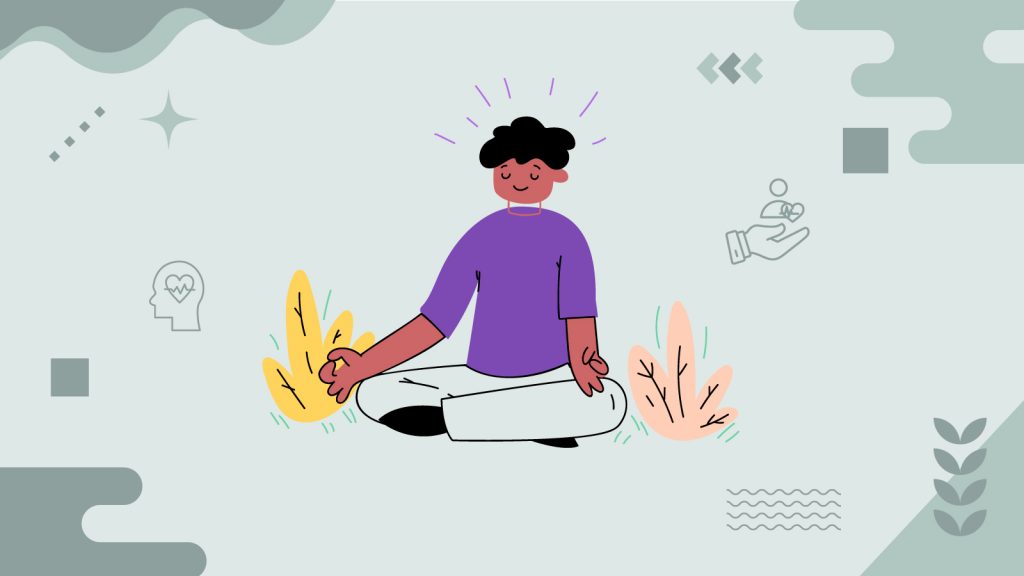“A dancing storm, destroying peace and calm, a restless mind, louder than the crashing waves at dawn.”
Unwanted thoughts never leave you alone? From the time you wake up in the morning, work throughout the day, and sometimes wake up in the middle of the night due to these thoughts?
If you struggle with this and cannot calm your mind for better clarity and focus, you need to find the cause to develop highly effective methods.
You may feel that too many thoughts are racing in your mind, making it almost impossible to focus on anything. Your mind is continuously sinking deeper into the ocean of thoughts that it can no longer reach the surface.
If this is you, then it becomes essential to understand the root causes and make some changes with effective techniques to bring a sense of calmness into your life.
This article will teach you how to conquer a troubled mind and obtain a highly productive, focused, and peaceful sense. Let’s get started!
What are the Reasons Behind Your Restless Mind?
There might be several reasons behind your restless mind, creating a whirlwind of thoughts from which you cannot escape.
Have you ever wondered why you feel like this? Why do these unnecessary thoughts keep running in your mind, disturbing your focus and mental clarity and making it difficult to think straight?
Several factors, such as stress from work, personal relationships, or constant digital indulgence, can affect mental peace and block one’s thought process. These trigger the brain’s amygdala into a state of hypervigilance.
Your prefrontal cortex, which is responsible for decision-making and rational thinking, will become overwhelmed, leading to a restless feeling.
🎭 Fun Fact
Your brain generates about 6,000 thoughts a day, and many are repetitive or negative, which can easily lead to a restless mind!
Did you know that about 1 in 5 people feel that they don’t know the exact cause of their anxiety or sadness? Most of the time, it is a collection of small and unaddressed issues, which makes it essential to recognize them and take the necessary steps toward calming your mind.
- Recognizing Triggers and Patterns
It is important to pay close attention to your daily routine and interactions to find the triggering points. You must notice if a specific person or activity is contributing to your anxious feelings. Once you can identify these triggers, you will be able to understand why your mind reacts this way.
- The Role of Neurotransmitters
Your brain chemicals play an important role in your mental state. If there is an imbalance in neurotransmitters like serotonin and dopamine, it will leave you feeling restless and anxious. Overcoming the situation takes time; however, if you are aware of the triggers, it will help you seek the right support.
How Calm Mind Works?
Think of your mind as a peaceful lake. When it is calm, it will clearly reflect every beautiful thing surrounding it. But with strong waves, everything becomes unclear.
Our brain works similarly. A calm mind uses a parasympathetic nervous system to promote relaxation and conserve energy. Your heart rate slows in this state, dropping the cortisol level so that your prefrontal cortex can function properly.
When you attain this zone, you can make better decisions, feel more connected to others, and experience a sense of inner peace.
🎭 Fun Fact
Did you know that a calm mind can actually increase creativity? When your brain isn’t overwhelmed by stress, it frees up space for more creative and innovative thinking!
Studies have shown that people who regularly practice mindfulness have a thicker prefrontal cortex, which is associated with emotional regulation and cognitive flexibility.
- The Science of Mindfulness
When we talk about mindfulness, it is more than just a trendy term. Practicing mindfulness is scientifically proven to reduce activity in your brain’s default mode network (DMN), which is responsible for zoning out and self-focused thoughts. Reducing DMN activity will help you experience a sense of calm and presence.
- Neuroplasticity and Calmness
Neuroplasticity is the ability of your brain to rewire itself. You can achieve this by practicing calming techniques, strengthening the neural pathways associated with relaxation, and weakening those linked to stress.
Effective Techniques to Instantly Calm Your Mind
When you are overwhelmed by situations and have no idea how to calm your mind quickly. Here are some of the tips that you can use for an immediate relief:
- Deep Breathing
Practicing deep breathing can help you calm yourself instantly. You start by inhaling slowly through your nose, holding your breath for a few seconds, and then exhaling through your mouth. This simple act stimulates your vagus nerve, promoting a relaxation response.
- Grounding Exercises
Another great way to keep yourself composed is to use grounding techniques to focus on the present moment. You must focus on what you can see, touch, hear, taste, and smell right now. This will help you stay in the present and prevent anxious thoughts.
- Progressive Muscle Relaxation
Progressive muscle relaxation can release tension buildup in your body and keep your brain calm. You can start from your toes and work up to your head. This technique will help you relieve physical tension and keep your mind relaxed.
- Visualization
You can keep your mind calm by closing your eyes and picturing a place where you feel at peace. It could be a quiet beach, a serene forest, or a cozy room. Visualization impacts the brain’s mirror neurons, which helps in creating a calming effect, making you feel like you are actually there.
- Engage in Physical Activity
Incorporating physical movements, such as short walks, cycling, or swimming, into your daily routine can have a powerful impact on your mind, making it more focused and composed by reducing stress and boosting your mood.
👉 Pro Tip
When using grounding exercises, try holding onto a cool object like a metal key or a glass of water. The temperature contrast helps sharpen your focus and anchors you even more in the present moment, providing quicker relief from overwhelming thoughts.
With these effective techniques, you can restore peace and calm to your mind and become more productive and focused.
Building Long-Term Habits for a Peaceful Mind
If you are looking for long-term habits to keep your mind peaceful and calm, then you must incorporate the techniques mentioned below into your daily routine and make a lasting impact:
- Mindfulness Meditation
Mindfulness is the best practice for keeping your mind composed and focused. You can make it a habit by taking just 10 minutes every day for meditation to reduce anxiety and increase your sense of overall well-being.
Research shows that regular meditation can change the structure of your brain and enhance the areas related to self-control and emotional regulation.
- Healthy Sleep Routine
Maintaining a healthy sleep schedule can have a great impact on developing a calm mind. Your brain relies on sleep when it comes to processing your emotions and reducing memories. If you are not getting enough sleep daily, it will lead to increased anxiety and a restless mind.
- Balanced Diet
For your brain to work properly, it is important to strengthen it with essential nutrients like omega-3 fatty acids, antioxidants, and vitamins. You must consume a diet rich in magnesium and vitamin D, as they are the best mood regulators and help maintain a calm state of mind.
- Journaling
Another great way to keep your mind sane and content is journaling. Just spending a few minutes daily writing down your thoughts can be a significant help in reducing the cluttered thoughts. It is a highly effective way to process your emotions, gain perspective, and declutter your mind.
- Limiting Digital Consumption
When you continuously indulge in your digital life, your mind gets filled with information, which can cause stress and restlessness. To avoid this, you must set boundaries for your digital consumption. You must prepare a specific time to check your emails and social media and take a regular digital detox.
Quick Question: What’s one daily habit you’ve been meaning to adopt for a calmer mind but haven’t started yet? How might your day improve if you commit to it today?
Building these long-term habits can help you maintain a peaceful mind for better focus and progress.
Conclusion
When it comes to calming your mind, it is not all about eliminating stress or completely erasing your thoughts. It is more about creating a balance for your mind to function properly and respond to the challenges of life with clarity and composure.
To bring calmness into your life, you must understand the reasons behind your restless mind and how you can quickly calm yourself down with effective techniques for the long term.
Always remember, it is not about achieving a perfect state of calm but about finding what works best for you. You can incorporate powerful techniques like mindfulness and meditation into your life for long-lasting peace and happiness.
“Mind still like a frog, calmness making a home, peace empowering, the storm was long gone.”
Mindful Activity: 5-Minute Sensory Reset
Take a moment to pause whatever you’re doing and try this quick sensory reset. It helps you focus on the present moment and calm your mind by engaging all five senses.
1: Sight: Look around and find five different objects. Notice their colors, shapes, and textures in detail.
2: Touch: Choose one object around you and feel its surface. Is it smooth, rough, cold, or warm? Focus on how it feels in your hands.
3: Hearing: Close your eyes and listen for four distinct sounds around you. It could be the hum of an appliance, birds outside, or your own breathing.
4: Smell: Identify three different smells. This could be the scent of your coffee, fresh air, or the subtle fragrance around you.
5: Taste: If you have a drink or snack nearby, take a small sip or bite and focus on its flavor. If not, imagine the taste of something you enjoy.
Take deep breaths as you go through each sense. By the end, you should feel more grounded and focused, with a calmer mind ready to tackle your day.





















